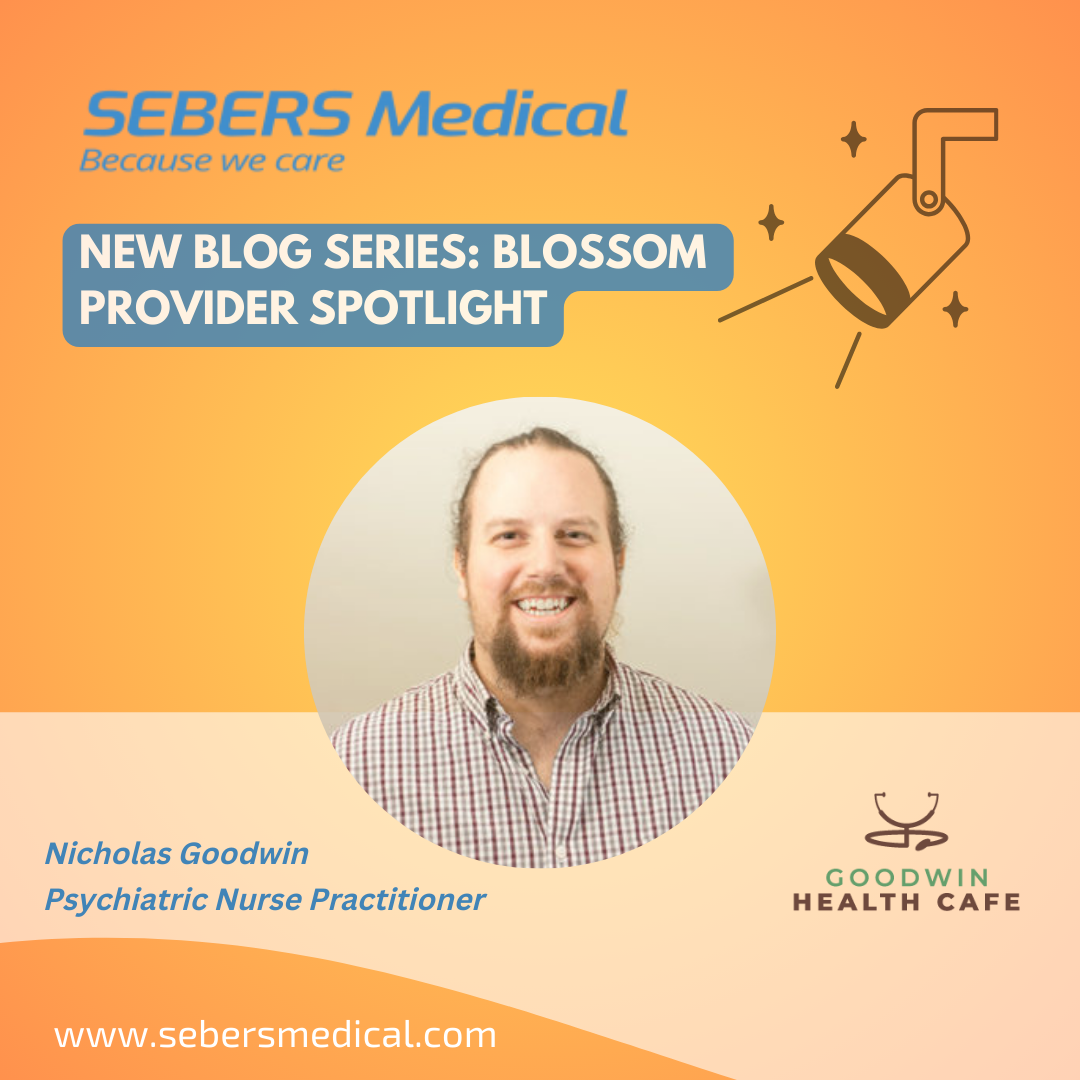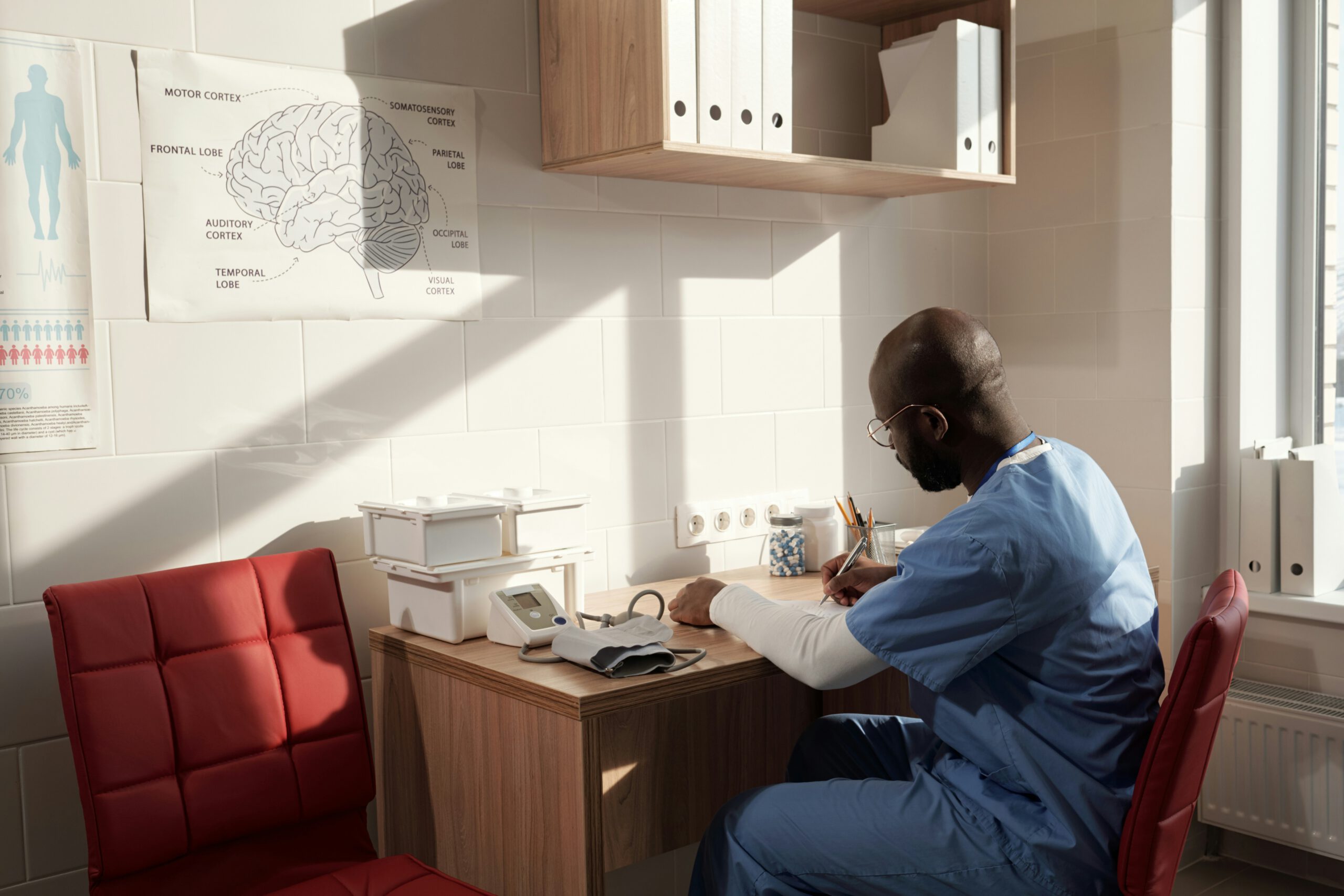Welcome to our first installment of the “Blossom Provider Spotlight,” where we feature insightful conversations with the exceptional providers using the Blossom TMS device. This week, we had the pleasure of speaking with Nicholas Goodwin, a psychiatric nurse practitioner and the founder of Goodwin Health Cafe in Spokane, Washington.
Tell us a little bit about your background in the field of mental health.
I’m Nicholas Goodwin, a psychiatric nurse practitioner. I obtained my nurse practitioner degree and doctorate in nursing practice from Washington State University in 2019. Before opening my private practice, Goodwin Health Cafe, I worked as a psychiatric nurse in a state hospital for five years and taught undergraduate psych nursing. I also have experience working in residential treatment centers for adolescents, dealing with both mental health and substance use programs.
What led you to incorporate TMS into your practice?
I started with esketamine (SPRAVATO) treatments, which allowed for in-office visits where patients could see the same staff regularly, fostering a collaborative and therapeutic environment. The success of these treatments led me to explore Transcranial Magnetic Stimulation (TMS), which shares a similar in-office treatment model. The non-invasive, drug-free nature of TMS, along with its high efficacy rates, made it a perfect addition to my practice.
Can you elaborate on the importance of patient compliance and in-office treatments?
One significant advantage of esketamine and TMS is that they require patients to come into the office for their treatments. This increases compliance and ensures patients receive their treatment as prescribed. The in-office model fosters honesty and transparency, allowing us to address issues promptly. This approach also has a strong therapeutic aspect. Patients build rapport with the staff, from casual interactions with front-end staff to more therapeutic engagements with nurse practitioners. Sometimes I wonder if patients come more for the therapeutic environment than the treatment itself!
What inspired you to pursue a career in mental health?
A series of events led me to the field of mental health. My mother was a social worker, which influenced my interest in helping others. During nursing school, I realized I wanted to specialize in psychiatric nursing because I found it both challenging and fulfilling. The connection I felt with patients and the opportunity to make a significant impact on their lives solidified my commitment to this career path.
What has been your favorite part about introducing TMS into your clinic?
I enjoy the in-office visits and the opportunity to offer more treatment options for patients with treatment-resistant depression. TMS machines are fascinating, and their non-pharmacological approach is a significant advantage, especially for patients who have had negative experiences with medications. Providing an effective treatment that doesn’t involve daily medication is a tremendous benefit for both the patients and the clinic.
Why did you choose the Blossom TMS device over other manufacturers?
Several factors influenced my decision to choose the Blossom TMS device. The Blossom machine is compact and easily movable, which is essential for our small office space. Additionally, it doesn’t require a special electrical setup, unlike some other machines. The simplicity and user-friendliness of the Blossom device were also major selling points. After researching and comparing different machines, I found Blossom to be the best fit for our clinic’s needs.
What advice would you give to other providers considering adding TMS to their practice?
I recommend visiting a facility where multiple TMS machines can be seen in action, preferably without the influence of sales representatives. Investing time and money in understanding the technology and its practical applications is crucial. Additionally, ensure that your state’s regulations and insurance policies are favorable for TMS treatments. Speaking with other clinics that have experience with different machines can provide valuable insights and help make an informed decision.
What are your hopes for the future of mental health treatment?
I hope to see more innovative treatments that go beyond traditional pharmaceuticals. The potential of psychedelics, for example, is fascinating, as they seem to offer significant benefits not always captured by conventional efficacy measurements. As we learn more about these treatments and how to measure their impact on well-being, I believe the overall effectiveness of mental health care can improve. My goal is to continue providing cutting-edge treatments and quickly adopt new, effective approaches as they become available.
Thank you, Nicholas, for sharing your experiences and insights with us! Stay tuned for more interviews in our “Blossom Provider Spotlight” series.
For more information about Goodwin Health Cafe, visit Goodwin Health Cafe.





